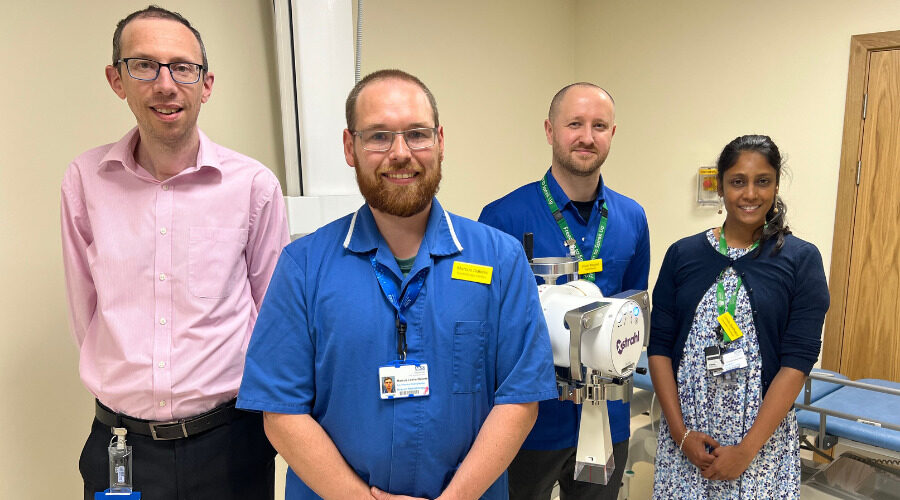
Spotlight
New radiotherapy superficial x-ray unit opens at Musgrove Park Hospital
Cancer treatment in Somerset has been handed a major boost following the opening of a brand new radiotherapy superficial x-ray unit at Musgrove Park.
The new unit was purpose-built off site and had to be craned into position at Musgrove in two halves by a huge crane that towered over Taunton.
Superficial x-ray is a type of radiotherapy that treats cancer on or close to the skin surface, with the radiation not travelling far into the body.
It’s also used to treat certain non-cancerous conditions, such as large scars on the body and inflammation of the foot – also known as plantar fasciitis – because the dose given is so precise, has high energy, and is near the skin surface.
A superficial x-ray is produced electronically through a tube and has a similar level of energy to diagnostic x-rays, with around 120kv voltage, or 220kv voltage when treating the slightly deeper skin lesions.
Jo Penman, our head of radiotherapy, said having the new superficial x-ray unit means our patients across the county can continue to access radiotherapy treatment in an environment that supports them best, while helping to reduce waiting times.
“Our new superficial x-ray unit gives us an additional radiotherapy facility alongside our existing linear accelerator machines, which may not be right for every patient,” she said.
“The waiting times in Somerset for treatment on a linear accelerator have increased significantly since the pandemic as we’re seeing many more patients with cancer.
“While these groups of patients can’t be treated on a superficial x-ray unit, we can help to ease the pressure on our linear accelerators by using it to treat other conditions.
“The superficial x-ray gives us the opportunity to spend a bit more time getting them into the position they need to be in as the unit isn’t quite as rigid as a linear accelerator.
“Our previous superficial x-ray unit was located in an area of the hospital's Old Building that needed to be knocked down in preparation for the building of our new surgical centre.
“We worked closely with our capital projects team to design the type of facility that we needed, providing a lead-lined building to house this new superficial x-ray unit.
“We wanted to ensure our new unit was futured proofed because these machines can last a minimum of 10 years, but often much longer as they are less complex to maintain.
“Everyone at the new unit and wider Beacon Centre want to say a huge thank you to the Somerset Unit for Radiotherapy Equipment (SURE) charity, which has bought so much equipment for the new unit – we’re really lucky to have such an amazing charity supporting us.”
Paul Alway, chair of SURE, said: “Since funding the original superficial X-ray equipment at Musgrove, SURE supporters and fundraisers have funded the introduction of many advances in treatment across the radiotherapy department and the wider hospital through our joint vision and roadmap, helping to improve the diagnosis, treatment and outcomes for cancer patients.
“SURE is currently funding the largest project we have ever undertaken with the introduction this year of Surface Guided Radiotherapy Treatment across the radiotherapy department, which will deliver a real step forward in radiotherapy treatment for Somerset.”
Jonathan Brindley, ModuleCo’s sales and marketing director, shared his thoughts on delivering another project with the trust:
“We are pleased to have worked in partnership with Somerset NHS Foundation Trust once again by providing another high-quality modular healthcare facility at Musgrove Park Hospital. This follows the delivery of two ophthalmic day surgery units, a PET-CT facility and a maternity theatre.
“This superficial X-ray facility, though smaller than our typical facility size, is significant in its complexity owed to its substantial 14mm lead lining. The lead lining was applied to the floor, walls and ceiling, in addition to a 750kg lead lined door, adding considerable weight to our already robust module design. The heaviest module we installed weighed in at an incredible 35 tonnes when only 8 meters in length.
“We look forward to continuing our working relationship with the trust on projects in development, now and others in the near future.”
